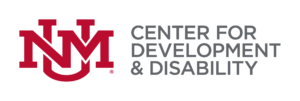Overview
The goal of the New Mexico Leadership in Neurodevelopmental and Related Disabilities Program (NM LEND) is to provide interdisciplinary leadership training for graduate students, community professionals, family members of individuals with developmental disabilities, and self-advocates to:
- Improve systems of care
- Promote the prevention of disabilities
- Improve access to services for children with neurodevelopmental and related disabilities and their families
This is accomplished through advanced clinical and leadership training, continuing education, and consultation. Trainees gain competencies in clinical care, family needs and preferences, and the public health system. NM LEND is a program within the Center for Development and Disability (CDD), University of New Mexico School of Medicine.
Purpose
The purpose of the NM LEND training program is to improve the health of infants, children and adolescents with or at risk for neurodevelopmental disabilities, including autism, and their families. This is accomplished through the training of professionals for leadership roles in providing health and related care. New Mexico children and their families are in need of highly trained professionals who have the knowledge, skills and leadership abilities to partner with families in helping their children reach their full potential.
Objectives
The trainee will develop knowledge through experiential learning:
- Family-Centered/Culturally Competent Practice
- Interdisciplinary PracticeKnowledge, Skills & Attitudes about
neurodevelopmental and related disabilities, including Autism Spectrum
Disorder Leadership - Research and Critical Thinking
- Policy and Advocacy
Disciplines
The NM LEND program includes, but is not limited to, faculty and trainees in:
- Family
- Nursing
- Nutrition
- Occupational Therapy
- Pediatrics/Medicine
- Pediatric Dentistry/Dental Hygiene
- Physical Therapy
- Psychiatry
- Psychology
- Public Administration
- Self-Advocate
- Social Work
- Special Education
- Speech-Language Pathology
National Network
LEND
There are 52 LEND programs across 44 states and the District of Columbia. They form a national network that shares information and resources to maximize their impact. The LENDs grew from the 1950s efforts of the Children's Bureau (now the Maternal and Child Health Bureau) to identify children with disabilities as a Title V priority.
AUCD
LEND programs operate within a university system, often as part of a University Center for Excellence (UCEDD). This setup gives them the expert faculty, facilities, and other resources necessary to provide exceptional interdisciplinary training and services. Through their membership in the Association of University Centers on Disabilities (AUCD), the LEND programs benefit from the national leadership and efforts to improve the lives of persons with disabilities and their families.
Maternal Child Health
The Maternal and Child Health Bureau (MCHB) is a federal bureau of the Health Resources and Services Administration.
HRSA Maternal and Child Health
In the 1980’s the LEND programs were funded under Title V of the Social Security Act and were administered through MCHB. As a result of the Autism CARES Act of 2014, the LEND programs are funded under the Public Health Service Act.
MCH Timeline/History: HRSA Maternal and Child Health Timeline
